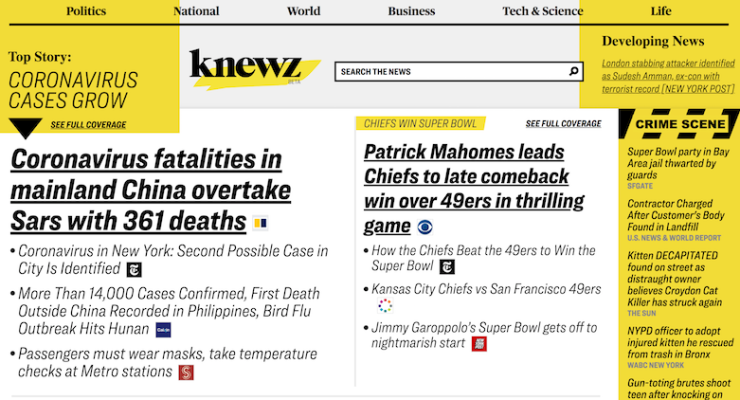
A few eyebrows were raised last week when that most politically aligned of global news media, News Corp, announced a search/aggregation platform for news “free of filter bubbles and narrow-minded nonsense”.
The Knewz platform promises to provide “headlines from publishers large and small, left and right, here, there and everywhere”.
If it seems a bit too good to be true, well, like all free offerings on the web, it probably is. The platform is part of News Corp’s big data play in its continuing fight with the big tech platforms over advertising. Instead of paying for the service in cash (like your Netflix subscription), you’ll pay through data (just like Facebook and Google).
Publishers and journalists usually get a bit giddy about any new platform that looks like it might draw additional traffic to their site where the audience can be monetised through advertising or subscriptions. But News Corp brings its reputation with it: it doesn’t play well with others.
That reputation means Knewz comes into the market under a cloud: can it be trusted?
Operating under the homophone Knewz, the site is now testing in beta, largely for a US target audience. Its text-heavy design comes with a challenging bright yellow colour scheme. Tech site boingboing dubbed it “Drudge Custard” and The Guardian reported complaints of “it’s making my eyes bleed”.
You get used to it, and the Knewz layout actually works well on mobile. Its internal search seems robust.
So far, it’s providing needed diversity. The top two coronavirus links are from the China-based publications that are providing the best on-the-ground coverage — the (more or less) independent Caixin from Beijing and the Hong Kong-based South China Morning Post. Google searches, on the other hand, take you to the traditional big US players which layers an un-helpful American screen over an Asian story.
But will News Corp be able to stop itself in tilting its outcomes to the right? It is, after all, an article of faith on the US right that Google is inherently left-wing. As with Fox’s “fair and balanced”, Knewz’s “free of filter bubbles” seems designed to justify providing greater space for voices of the right.
Already, its prominent US headlines include stories from right-wing voices like The Washington Times and The Blaze, including the lead story about the weekend’s blow-up between Bernie Sanders surrogate Rashida Tlaib and Hillary Clinton.
The platform says it eschews “crass clickbait”, but the lead story on the Weinstein trial screams “HE’S INTERSEX” in all caps. It’s fresh from the US edition of the company’s Sun newspaper, launched just last month.
As a data play, Knewz falls into the News Corp strategy to merge what it knows about its users (“first-party data” in marketing jargon) into a single database (News IQ) integrating “all of its collective first-party data, premium media properties and data science tools into one unified advertising solution” for selling to advertisers.
Working with its Fox Broadcasting sibling and other partners, the News IQ platform claimed to reach 140 million people in the US.
This suggests the data it holds can create targeted marketing for about half the population across the US, the UK and Australia — and even more in places like Queensland, where News Corp has an effective commercial news monopoly.
But it’s not enough to compete with Facebook and Google, where Australians spend about 40% of their time online (compared to 2.3% on all news sites).
Here’s a sign of the challenge: at launch, News IQ promised to “complement the video ad platform and emotional targeting capabilities of News Corp’s Unruly”. Last month, the company sold the programmatic video marketplace to Tremor for stock worth about $30 million. It bought the company in 2015 for $262 million.
The underlying premise of Knewz is also under challenge. The platform was launched in the same week that the Reuters Institute in the UK released its findings on filter bubbles. It concluded that the “automated serendipity” of search and aggregation sites (between them, about 30% of news readership) actually diversifies news sources.
People who use search engines, the institute found, “use more sources, are more likely to use both left- and right-leaning sources and have news diets that are more balanced between left and right”.








Where’s the rest of this edition??????????????????????????????????????
“Please do not explain, just supply.”
Thanks
LOL “Drudge Custard” is such a brilliant description.
“Is it the truth – or did you catch it from Murdoch?”
“Knewz” – i.e. bias confirmation fodder. As in “I knew it.”
Not a promising moniker.